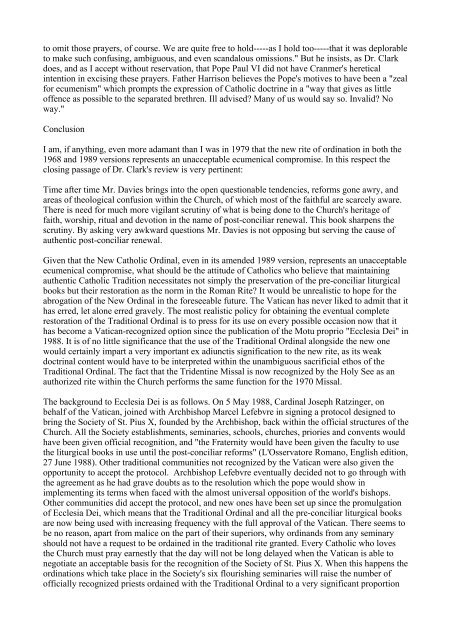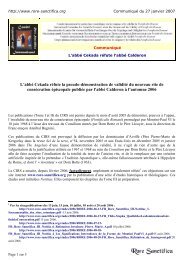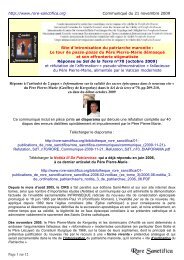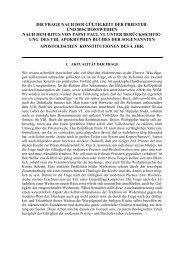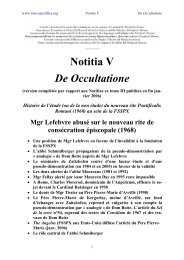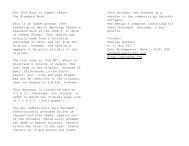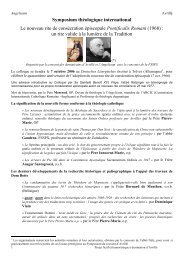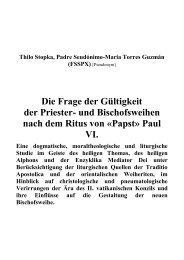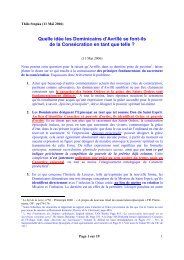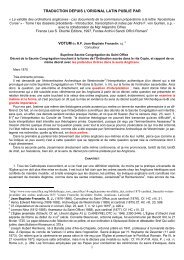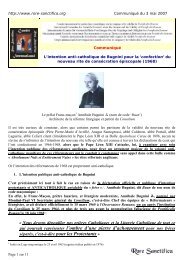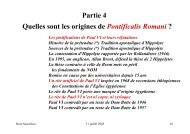THE ORDER OF MELCHISEDECH A Defence of ... - Rore Sanctifica
THE ORDER OF MELCHISEDECH A Defence of ... - Rore Sanctifica
THE ORDER OF MELCHISEDECH A Defence of ... - Rore Sanctifica
You also want an ePaper? Increase the reach of your titles
YUMPU automatically turns print PDFs into web optimized ePapers that Google loves.
to omit those prayers, <strong>of</strong> course. We are quite free to hold-----as I hold too-----that it was deplorable<br />
to make such confusing, ambiguous, and even scandalous omissions." But he insists, as Dr. Clark<br />
does, and as I accept without reservation, that Pope Paul VI did not have Cranmer's heretical<br />
intention in excising these prayers. Father Harrison believes the Pope's motives to have been a "zeal<br />
for ecumenism" which prompts the expression <strong>of</strong> Catholic doctrine in a "way that gives as little<br />
<strong>of</strong>fence as possible to the separated brethren. Ill advised? Many <strong>of</strong> us would say so. Invalid? No<br />
way."<br />
Conclusion<br />
I am, if anything, even more adamant than I was in 1979 that the new rite <strong>of</strong> ordination in both the<br />
1968 and 1989 versions represents an unacceptable ecumenical compromise. In this respect the<br />
closing passage <strong>of</strong> Dr. Clark's review is very pertinent:<br />
Time after time Mr. Davies brings into the open questionable tendencies, reforms gone awry, and<br />
areas <strong>of</strong> theological confusion within the Church, <strong>of</strong> which most <strong>of</strong> the faithful are scarcely aware.<br />
There is need for much more vigilant scrutiny <strong>of</strong> what is being done to the Church's heritage <strong>of</strong><br />
faith, worship, ritual and devotion in the name <strong>of</strong> post-conciliar renewal. This book sharpens the<br />
scrutiny. By asking very awkward questions Mr. Davies is not opposing but serving the cause <strong>of</strong><br />
authentic post-conciliar renewal.<br />
Given that the New Catholic Ordinal, even in its amended 1989 version, represents an unacceptable<br />
ecumenical compromise, what should be the attitude <strong>of</strong> Catholics who believe that maintaining<br />
authentic Catholic Tradition necessitates not simply the preservation <strong>of</strong> the pre-conciliar liturgical<br />
books but their restoration as the norm in the Roman Rite? It would be unrealistic to hope for the<br />
abrogation <strong>of</strong> the New Ordinal in the foreseeable future. The Vatican has never liked to admit that it<br />
has erred, let alone erred gravely. The most realistic policy for obtaining the eventual complete<br />
restoration <strong>of</strong> the Traditional Ordinal is to press for its use on every possible occasion now that it<br />
has become a Vatican-recognized option since the publication <strong>of</strong> the Motu proprio "Ecclesia Dei" in<br />
1988. It is <strong>of</strong> no little significance that the use <strong>of</strong> the Traditional Ordinal alongside the new one<br />
would certainly impart a very important ex adiunctis signification to the new rite, as its weak<br />
doctrinal content would have to be interpreted within the unambiguous sacrificial ethos <strong>of</strong> the<br />
Traditional Ordinal. The fact that the Tridentine Missal is now recognized by the Holy See as an<br />
authorized rite within the Church performs the same function for the 1970 Missal.<br />
The background to Ecclesia Dei is as follows. On 5 May 1988, Cardinal Joseph Ratzinger, on<br />
behalf <strong>of</strong> the Vatican, joined with Archbishop Marcel Lefebvre in signing a protocol designed to<br />
bring the Society <strong>of</strong> St. Pius X, founded by the Archbishop, back within the <strong>of</strong>ficial structures <strong>of</strong> the<br />
Church. All the Society establishments, seminaries, schools, churches, priories and convents would<br />
have been given <strong>of</strong>ficial recognition, and "the Fraternity would have been given the faculty to use<br />
the liturgical books in use until the post-conciliar reforms" (L'Osservatore Romano, English edition,<br />
27 June 1988). Other traditional communities not recognized by the Vatican were also given the<br />
opportunity to accept the protocol. Archbishop Lefebvre eventually decided not to go through with<br />
the agreement as he had grave doubts as to the resolution which the pope would show in<br />
implementing its terms when faced with the almost universal opposition <strong>of</strong> the world's bishops.<br />
Other communities did accept the protocol, and new ones have been set up since the promulgation<br />
<strong>of</strong> Ecclesia Dei, which means that the Traditional Ordinal and all the pre-conciliar liturgical books<br />
are now being used with increasing frequency with the full approval <strong>of</strong> the Vatican. There seems to<br />
be no reason, apart from malice on the part <strong>of</strong> their superiors, why ordinands from any seminary<br />
should not have a request to be ordained in the traditional rite granted. Every Catholic who loves<br />
the Church must pray earnestly that the day will not be long delayed when the Vatican is able to<br />
negotiate an acceptable basis for the recognition <strong>of</strong> the Society <strong>of</strong> St. Pius X. When this happens the<br />
ordinations which take place in the Society's six flourishing seminaries will raise the number <strong>of</strong><br />
<strong>of</strong>ficially recognized priests ordained with the Traditional Ordinal to a very significant proportion


